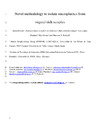Identificador persistente para citar o vincular este elemento:
https://accedacris.ulpgc.es/jspui/handle/10553/41353
| Título: | Novel methodology to isolate microplastics from vegetal-rich samples | Autores/as: | Herrera, Alicia Garrido-Amador, Paloma Martínez, Ico Samper, Maria Dolores Lopez-Martinez, Juan Gomez, May Packard, Theodore T. |
Clasificación UNESCO: | 251001 Oceanografía biológica 241705 Biología marina |
Palabras clave: | Marine litter Microplastics Plastic extraction Density separation Organic material, et al. |
Fecha de publicación: | 2018 | Publicación seriada: | Marine Pollution Bulletin | Resumen: | Microplastics are small plastic particles, globally distributed throughout the oceans. To properly study them, all the methodologies for their sampling, extraction, and measurement should be standardized. For heterogeneous samples containing sediments, animal tissues and zooplankton, several procedures have been described. However, definitive methodologies for samples, rich in algae and plant material, have not yet been developed. The aim of this study was to find the best extraction protocol for vegetal-rich samples by comparing the efficacies of five previously described digestion methods, and a novel density separation method. A protocol using 96% ethanol for density separation was better than the five digestion methods tested, even better than using H2O2 digestion. As it was the most efficient, simple, safe and inexpensive method for isolating microplastics from vegetal rich samples, we recommend it as a standard separation method. | URI: | https://accedacris.ulpgc.es/handle/10553/41353 | ISSN: | 0025-326X | DOI: | 10.1016/j.marpolbul.2018.02.015 | Fuente: | Marine Pollution Bulletin[ISSN 0025-326X],v. 129, p. 61-69 |
| Colección: | Artículos |
Citas SCOPUSTM
113
actualizado el 08-jun-2025
Citas de WEB OF SCIENCETM
Citations
104
actualizado el 15-feb-2026
Visitas
30
actualizado el 10-ene-2026
Descargas
2
actualizado el 10-ene-2026
Google ScholarTM
Verifica
Altmetric
Comparte
Exporta metadatos
Los elementos en ULPGC accedaCRIS están protegidos por derechos de autor con todos los derechos reservados, a menos que se indique lo contrario.
